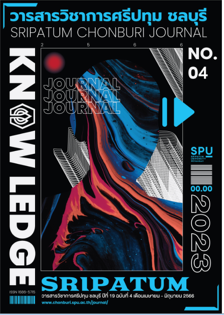FACTORS OF DIGITAL LITERACY AND ACCEPTANCE OF TECHNOLOGY INFLUENCING DECISION TO BUY DIGITAL LOTTERY TICKETS THROUGH THE "PAOTANG" APPLICATION OF CONSUMERS IN BANGKOK
Keywords:
Purchasing Decision, Perceived Ease of Use, Perceived UsefulnessAbstract
The objective of this study was to study digital literacy and technology acceptance factors in terms of perceived benefits and perceived ease that influenced digital lottery decision making through wallet applications and to investigate the causal relationship between digital literacy and technology acceptance factors in terms of perceived benefits and the ease with which digital lottery purchasing decisions were influenced through the wallet application. The sampling group selected by a convenient sampling method was a group of 430 people in Bangkok who had purchased digital lottery tickets through their wallet application. The questionnaire was used as a data collection tool by testing the confidence of the questionnaire. The alpha coefficient according to Kronbach's method was at .97. Statistics used in data analysis included frequency, percentage, mean, standard deviation, and factor testing with some least squares structural equation variable analysis. The program SmartPLS was used to conduct a survey of the respondents: The majority of respondents were male, 31-40 years of age, private company employees, and had the highest level of opinion on technology acceptance, technology acceptance, ease-of-use, digital literacy and purchasing decisions. When considering digital literacy items, it had a statistically significant effect on purchasing decision making, utility perception, and ease perception at the .05 level. In addition, the perception of benefits and the perception of ease had a statistically significant impact on the decision to purchase digital lottery tickets through the wallet application at .05.
References
ชรัชต์ วิภัชปรีชากุล. (2564). การศึกษาพฤติกรรมการใช้แอปพลิเคชันเป๋าตังของประชากรในเขตกรุงเทพมหานคร (ออนไลน์). เข้าถึงได้จาก:
https://mmm.ru.ac.th/MMM/IS/twin-9/6214155039.pdf [2565, 5 มกราคม].
เพ็ญพร ปุกหุต, ปฏิมา ถนิมกาญจน์ และพรทิพย์ รอดพ้น. (2565). การยอมรับเทคโนโลยีและพฤติกรรมผู้บริโภคที่มีผลต่อการตัดสินใจซื้อ
สินค้าออนไลน์ของผู้กำลังจะเข้าสู่สังคมผู้สูงอายุในอำเภอเมืองจังหวัดนครราชสีมา. วารสารวิชาการมหาวิทยาลัยหอการค้าไทย
มนุษยศาสตร์และสังคมศาสตร์, 42(4), หน้า 16-35.
ศูนย์ศึกษาปัญหาการพนัน. (2560). สถานการณ์การพนันในสังคมไทยปี 2560 (ออนไลน์). เข้าถึงได้จาก: http://www.gamblingstudy-
th.org/imgadmins/book_file/2560-National-Survey-Presentaion-for-CGS-Seminar2561.pdf [2565, 27 ธันวาคม].
สำนักงานสถิติแห่งชาติ. (2563). สรุปผลที่สำคัญสำรวจการมีการใช้เทคโนโลยีสารสนเทศและการสื่อสารในครัวเรือน พ.ศ. 2563
(ออนไลน์). เข้าถึงได้จาก: https://www.nso.go.th/sites/2014/DocLib13/%E0%B8%94%E0%B9%89%E0%B8%B2%E0%B8%99ICT/%E0%B9%80%E0%B8%97%E0%B8%84%E0%B9%82%E0%B8%99%E0%B9%82%E0%B8%A5%E0%B8%A2%E0%B8%B5%E0%B9%83%E0%B8%99%E0%B8%84%E0%B8%A3%E0%B8%B1%E0%B8%A7%E0%B9%80%E0%B8%A3%E0%B8%B7%E0%B8%AD%E0%B8%99/2563/Pocketbook63.pdf [2565, 1 ธันวาคม].
สุธิรา ชัยรักษา. (2563). ปฏิสัมพันธ์ทางสังคมผ่านสังคมออนไลน์: กรณีศึกษานักศึกษามหาวิทยาลัยราชภัฎ นครศรีธรรมราช.
วารสารนาคบุตรปริทรรศน์, 12(1), หน้า 77-85.
Elhajjar, S., & Ouaida, F. (2020). An analysis of factors affecting mobile banking adoption. International Journal
of Bank Marketing, 38(2), pp. 352-367.
Feriady, M., Nurkhin, A., Mahmud, N., Setiani, R., & Astuti, D. (2020). Influence of organizational suport and digital
literacy on lecturer acceptance of e-learning in indonesia: A modification of technologi acceptance model.
International Journal of Scientific and Technology Research, 9(1), pp. 2229-2233.
Hair, J. F., Black, W. C., & Babin, B. J. (2010). Multivariate Data Analysis: A Global Perspective. Upper Saddle River,NJ:
Pearson Education.
Iqbal, M.K. (2019). An Empirical Study on the Effect of Perceived Usefulness and Ease of Use on Purchase Intention
Through Mobile Devices in Pakistan: A Mediating Role of Online Trust. European Journal of Business and
Management, 10(17), pp. 30-35.
NAZZAL, A., THOYIB, A., Djumilah, Z. A. I. N., & HUSSEIN, A. S. (2021). The influence of digital literacy and
demographic characteristics on online shopping intention: An empirical study in Palestine. The Journal of Asian
Finance, Economics and Business (JAFEB), 8, pp. 205-215.
Nguyen, T. D., & Barrett, N. J. (2006). The adoption of the internet by export firms in transitional markets. Asia
Pacific Journal of Marketing and Logistics, 18(1), pp. 29-42.
Ramayah, T., Rouibah, K., Gopi, M., & Rangel, G. J. (2009). A decomposed theory of reasoned action to explain
intention to use Internet stock trading among Malaysian investors. Computers in Human Behavior, 25(6),
pp. 1222-1230.
Downloads
Published
Issue
Section
License
Copyright (c) 2023 วารสารวิชาการศรีปทุม ชลบุรี Sripatum Chonburi Journal

This work is licensed under a Creative Commons Attribution-NonCommercial-NoDerivatives 4.0 International License.
บทความทุกบทความเป็นลิขสิทธิ์ของวารสารวิชาการศรีปทุม ชลบุรี



